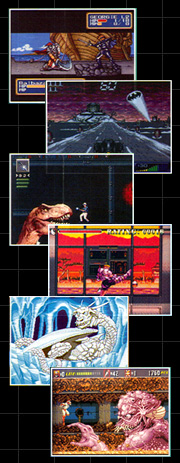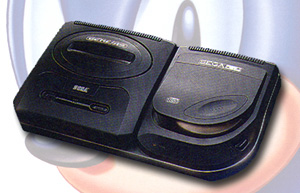

|
Sega! By Greg Gillis
AFTER ANOTHER SUCCESSFUL holiday season, the Genesis system continued to receive outstanding software support straight into the new year. Titles like Flashback, X-Men, Shining Force, Shinobi III, Ranger-X and Gunstar Heroes were released more evenly throughout the year, while Sega players across North America no doubt breathed a collective sigh of relief when Capcom finally unveiled the Genesis version of its flagship title, Street Fighter II. 1993 saw the Sega CD at last start to receive the kind of triple-A software support everyone had been hoping for from the outset. Jaguar XJ220, Thunderstrike, Silpheed, Sonic CD and Lunar the Silver Star all served to demonstrate that Sega's shiny new peripheral was capable of much more than full-motion-video point-and-click contests (although there were still plenty of those to choose from as well!). The Genesis and Sega CD were also effectively "relaunched" in 1993 with new, streamlined designs that allowed for lower hardware prices. Owners of the older model Genesis could still use the newer "clamshell" model Sega CD with the addition of an included extension module designed to accommodate the older system's additional girth. Sega also set about creating a unified packaging design for games on their various systems, ultimately settling upon a colour-coded diagonal stripe pattern: red for Genesis; blue for Sega CD; purple for Game Gear. The issue of violence in video games came to the fore in 1993, with games like Night Trap for the Sega CD receiving unprecedented media scrutiny. By far the most controversial title of the year, however, was Acclaim's Mortal Kombat for the Genesis system and SNES. Parents and senators alike were outraged by the level of graphic violence depicted in the arcade version of the game, so Nintendo directed Acclaim to change the blood in the game to "sweat" and to replace the arcade's gruesome "fatalities" with less violent finishing moves. Sega took a somewhat different approach by allowing all of the arcade game's gore into the Genesis version provided it could only be accessed through a special code. Sega also instituted a new video game ratings system for all Genesis and Sega CD titles, which ranged in severity from the family friendly GA rating to the adults-only rating of MA-17. Despite the ratings system, or perhaps because of it, the Genesis version of Mortal Kombat with all of its gore intact was well received by the gaming press, while Nintendo was criticised for censoring the SNES version of the game. It was a mistake Nintendo would not repeat the following year... Controversial ugliness aside, with solid titles being released for the Genesis and Sega CD throughout the year, as well as lower hardware prices and the introduction of the infamous "Sega scream" ad campaign, 1993 proved to be a hugely successful year for Sega as a company and perhaps the last truly great year for the Genesis system itself. "[At the Summer CES] Sega had the best presentation I have seen in three years, with an entirely new display for '93. Their recent growth into a major force was definitely apparent with a huge display including dedicated Activator, Game Gear, CD, Virtua and sports areas, as well as the phenomenal new Sonic arcade game (which blows away anything I've ever seen in the arcades) and the impressive AS-1." |
